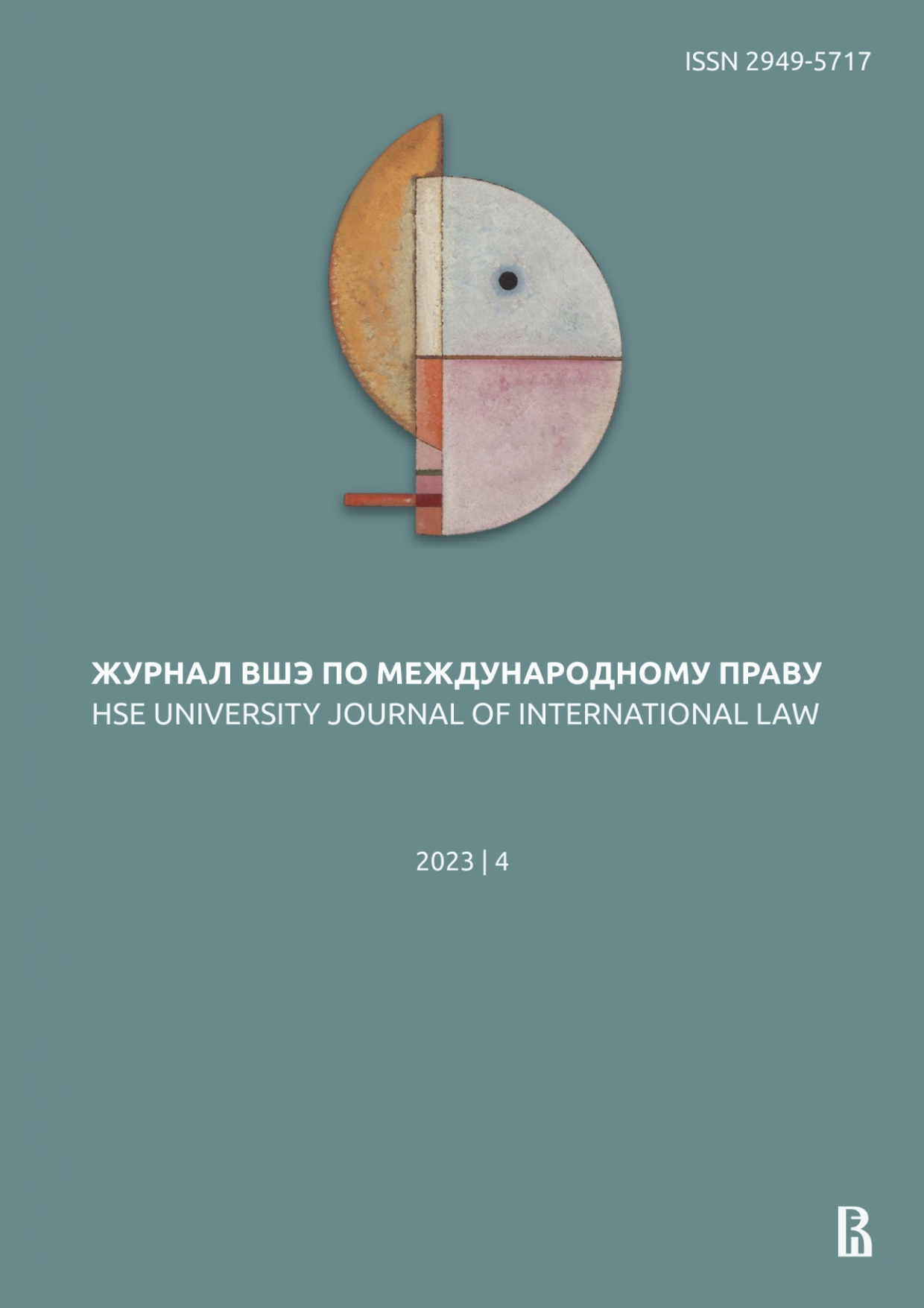Systemic Interpretation of the European Convention on Human Rights and its Protocols: Creeping Fragmentation of State Responsibility
Abstract
The article discusses how the European Court of Human Rights (hereinafter — ECtHR, the Court) influences the way the European Convention on Human Rights (hereinafter — ECHR, the Convention) is systematically interpreted in the context of state responsibility. The article highlights that interpretation of the Convention and general principles of state responsibility is crucial for holding states accountable, ensuring justice for victims, and upholding the credibility and coherence of international law. For this reason, it is essential for the Court to carefully interpret the ECHR within the broader context of international law. The authors believe that one of the most practical strategies to analyse this issue is through determining the consistency of the European Court of Human Rights’ approach to state responsibility issues, elaborated through its case-law, with general customary rules of international law. It can be effectively performed through the lens of three fundamental problems: jurisdiction and attribution interaction problem; issues of state responsibility for the acts of international organisations, paying special attention to peace-keeping operations; and third-state responsibility problem. The analysis shows that the Court creates its own criteria, often conflicting with each other, by ignoring established general rules of international law on state responsibility. Lastly, the authors show that while the Court often acts as a lawmaker, it should create the law in a unified way to apply it fair and equally for the purposes of human rights protection. It is not the states and their particular interests that should govern the application of law by the Court. In the end, the authors come to the conclusion that the policy behind the Court’s decisions is not only predominantly inconsistent with the general customary rules of international law and the object and purpose of the Convention, but also results in the creeping fragmentation of the international law on state responsibility.
Downloads
References
Albuquerque P., Wojtyczek K. (2019) Judicial Power in a Globalized World. Berlin: Springer International Publishing. DOI: https://doi.org/10.1007/978-3-030-20744-1
Besson S. (2012) The Extraterritoriality of the European Convention on Human Rights: Why Human Rights Depend on Jurisdiction and What Jurisdiction Amounts To. Leiden Journal of International Law, vol. 25, no. 4, pp. 857–884. DOI: https://doi.org/10.1017/s0922156512000489
Brownlie I. (2005) The Responsibility of States for the Acts of International Organizations. In: Ragazzi M. International Responsibility Today. Brill Nijhoff, pp. 355–362. DOI: https://doi.org/10.1163/9789047407706_039
Crawford J. (2013) State Responsibility: The General Part, New York, USA: Cambridge University Press. DOI: https://doi.org/10.1017/s0020589315000378
Crawford J., Keene A. (2018) The Structure of State Responsibility under the European Convention on Human Rights. In: The European Convention on Human Rights and General International Law. Vol. 1, New York, USA: Oxford University Press. DOI: https://doi.org/10.1093/oso/9780198830009.003.0010
Evans M. (2004) State Responsibility and the European Convention on Human Rights: Role and Realm. In: Fitzmaurice M., Sarooshi D. (eds.) Issues of State Responsibility before International Judicial Institutions. The Clifford Chance Lectures, Hart Publishing, vol. 7, pp. 139–160. DOI: https://doi.org/10.5040/9781472563033.ch-009
Fink M. (2014) The European Court of Human Rights and State Responsibility. The European Court of Human Rights and Public International Law: Fragmentation or Unity, Baden-Baden: Nomos; Wien: Facultas.
Gill T., Fleck D. (2018) The Handbook of the International Law of Military Operations, New York, NY, US: Oxford University Press.
Koskenniemi M. (2005) From Apology to Utopia: The Structure of International Legal Argument, Cambridge, UK: Cambridge University Press. DOI: https://doi.org/10.1017/CBO9780511493713
Koskenniemi M. (2006) Fragmentation of International Law. Difficulties Arising from Diversification and Expansion of International Law. Report of the Study Group of the International Law Commission. Yearbook of the International Law Commission, vol. II, part 2, pp. 175–184. DOI: https://doi.org/10.18356/25997571-en
Larsen K. (2008) Attribution of Conduct in Peace Operations: The Ultimate Authority and Control Test. European Journal of International Law, vol. 19, no. 3, pp. 509–531. DOI: https://doi.org/10.1093/ejil/chn029
Milanovic M. (2011) Extraterritorial Application of Human Rights Treaties: Law, Principles, and Policy. Oxford University Press. DOI: http://doi.org/10.1093/hrlr/ngs041
Milanović M., Papić T. (2009) As Bad As It Gets: the European Court of Human Rights's Behrami and Saramati Decision and General International Law. International & Comparative Law Quarterly, vol. 58, no. 2, pp. 267–296. DOI: https://doi.org/10.1017/s002058930900102x
Milanović M., Papić T. (2021) Case Note on Makuchyan and Minasyan v. Azerbaijan and Hungary. American Journal of International Law, no. 115, pp. 294–301. DOI: https://doi.org/10.1017/ajil.2021.6
Motoc I., Vasel J. (2018) The ECHR and Responsibility of the State: Moving Towards Judicial Integration-A View from the Bench. DOI: http://doi.org/10.2139/ssrn.3178724
Peters A. (2016) Fragmentation and Constitutionalization. In: Orford A., Hoffmann F., Clark M. (eds.) The Oxford Handbook of the Theory of International Law, Oxford, UK: Oxford University Press. DOI: https://doi.org/10.1093/law/9780198701958.003.0049
Pirola F. (2023) Between Deference and Activism: The ECtHR as a Court on States or a Court on Rights? Exploring the ECtHR Interpretative Tools. Université Côte d'Azur, Università degli studi di Milano, Bicocca.
Repetto G. (2013) The Constitutional Relevance of the ECHR in Domestic and European Law, Cambridge-Antwerp-Portland: Intersentia.
Ryngaert C. (2011) The European Court of Human Rights’ Approach to the Responsibility of Member States in Connection with Acts of International Organizations. International & Comparative Law Quarterly, vol. 60, no. 4, pp. 997–1016. DOI: http://doi.org/10.1017/S0020589311000467
Šturma P. (2020) State Responsibility and the European Convention on Human Rights. Czech Yearbook of Public & Private International Law, vol. 11, pp. 3–18.
Tzevelekos V. (2010) The Use of Article 31 (3)(C) of the VCLT in the Case Law of the ECtHR: An Effective Anti-Fragmentation Tool or a Selective Loophole for the Reinforcement of Human Rights Teleology-Between Evolution and Systemic Integration. Michigan Journal of International Law, vol. 31, no. 3, pp. 621–690.
Verdross A. (1926) Constitution of International Legal Community, Springer.
This work is licensed under CC BY-NC-ND 4.0


